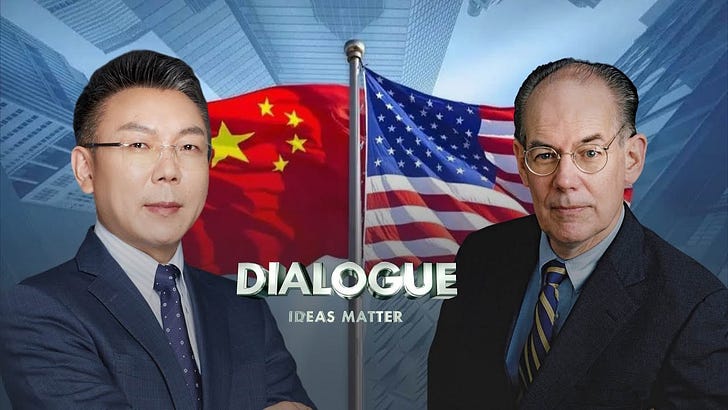This was the Biden Administration's view of the Russo-Ukraine War all along?
The US positioning for a negotiated peace (of some kind) in Ukraine
Michael Hirsh reports based on information from “a Biden administration official and a European diplomat based in Washington”:
The administration official told POLITICO Magazine this week that much of this strategic shift to defense is aimed at shoring up Ukraine’s position in any future negotiation. “That’s been our theory of the case throughout — the only way this war ends ultimately is through negotiation,” said the official, a White House spokesperson who was given anonymity because they are not authorized to speak on the record. “We want Ukraine to have the strongest hand possible when that comes.” The spokesperson emphasized, however, that no talks are planned yet, and that Ukrainian forces are still on the offensive in places and continue to kill and wound thousands of Russian troops. “We want them to be in a stronger position to hold their territory. It’s not that we’re discouraging them from launching any new offensive,” the spokesperson added.1 [my emphasis]
There’s nothing especially surprising about this. But it’s definitely a shift from the kind of domino-theory talk we’ve been hearing from the Administration for the last two years. Along the lines of: If Russia gets away with this China will invade Taiwan tomorrow!!! and the like.
Hirsh explains this shift as just another step in a complicated war situation, which of course it is: “As it helps Ukraine shift to a more defensive posture, the Biden administration can’t appear to be handing the advantage to Putin after insisting since the war began in February 2022 that it stands fully behind Zelenskyy’s pledge of victory over Moscow.”
It’s a reminder that grandiose statements of foreign policy goals and positions in wars are all, shall we say, subject to change. And that trying to figure out what a wartime leadership is really up to often feels like making astrological readings or consulting some esoteric oracle. Some of the pundits’ gossip on that matter may be marginally more helpful.
This new messaging has to be at least partly aimed at shaming the Republicans in Congress into voting for continued aid to Ukraine.
This seems to be a bit of stenography:
At his year-end news conference in early December, Zelenskyy said Ukraine was preparing new proposals to end the war but he added that he would not alter his insistence that Russia withdraw all forces. Kirby reaffirmed the administration line that “we are not dictating terms to President Zelenskyy.” Instead, he said, the White House is helping Zelenskyy to “operationalize” his own peace proposal “with interlocutors around the world.”
“Not dictating terms” in this context is a great example of public diplomacy weasal words. Anything short of “agree to this thing now or we’re nuking your capital city tomorrow morning” could count as “not dictating terms” here.
The piece goes on to explain that this is a case of putting the proverbial lipstick on a pig. That is, the war is in a not-quite-stalemate situation in which Russia at the moment has a distinct advantage and is in a good position to take more Ukrainian territory in the next few months if it chooses to. The bright side from the American viewpoint is that Russia is currently able to negotiate from a position of strength, which could mean they might be more willing to make an acceptable deal for a long-term ceasefire. Unless they decide to take more territory before getting to that point.
This is a cryptic comment: “The European diplomat based in Washington said that the European Union is also raising the threat of expediting Ukraine’s membership in NATO to ‘put the Ukrainians in the best situation possible to negotiate’ with Moscow.”
Why can’t reports like this say the obvious? Which in this case is that making Ukraine a NATO member while part of their legal territory is occupied by Russia would require NATO countries to immediately go to war with Russia. Even if Ukraine met the current criteria to join NATO otherwise, that’s just not going to happen in the middle of this current war or while Russia is occupying Ukrainian territory.
Russian leaders surely know that, too. And Ukraine’s leaders know it as well, one would hope. So this messaging is aimed more at domestic audiences in NATO countries than to any government. (We could at least imagine an arrangement like West Germany and East Germany and their respective formal military alliances but that would put us in Tarot-card-reading mode at this juncture.)
It’s Politico, so there is also gossip about the horse-race implications for the Presidential election.
But there is at least a reminder that Ukraine has domestic politics, too:
The Ukrainians themselves are engaged in what is becoming a very public debate about how long they can hold out against Putin. With Ukraine running low on troops as well as weapons, Zelenskyy’s refusal to consider any fresh negotiations with Moscow is looking more and more politically untenable at home. The Ukrainian president, seeking to draft another half million troops, is facing rising domestic opposition from his military commander in chief, Gen. Valeriy Zaluzhnyi, and the mayor of Kyiv, Vitali Klitschko. [my emphasis]
John Mearsheimer has been doing interviews all over the place the last few weeks, with both Ukraine and Israel being major topics he’s asked to address. In this recent one, he talks about how he sees Ukraine’s current situation. As he notes in posting it on his Substack page2, it’s an interview with CGTN, a Chinese news outlet headquarter in Beijing. He doesn’t mention anything about it having been edited, so he clearly takes it as an accurate representation of what he said in the interview.
Hirsh, Michael (2023): The Biden Administration Is Quietly Shifting Its Strategy in Ukraine. Politico Magazine 12/27/2023. <https://www.politico.com/news/magazine/2023/12/27/biden-endgame-ukraine-00133211> (Accessed: 2023-28-12).
Mearsheimer, John (2023): Interview with Chinese TV (CGTN). John’s Substack 12/28/2023. (Accessed: 2023-29-12).


